Entrepreneurship and Small Business Management - Analysis Report
VerifiedAdded on 2020/10/05
|17
|5213
|285
Report
AI Summary
This report delves into the multifaceted world of entrepreneurship and small business management. It begins by examining various entrepreneurial ventures, differentiating between small businesses, scalable startups, large companies, and social enterprises, while also exploring the similarities and differences between private and public sectors. The report then analyzes the impact of micro and small businesses on the economy, using statistical data to illustrate their contributions. Furthermore, it investigates how small businesses and startups contribute to the social economy. The core of the report identifies and evaluates the characteristics, traits, and skills of successful entrepreneurs, as well as the influence of entrepreneurial personality on motivation and mindset. Finally, it examines the role of background and experience in fostering entrepreneurship. The report provides a comprehensive overview, drawing on data and analysis to present a detailed picture of entrepreneurship's role in the economy and society.

Entrepreneurship
and
Small Business Management
and
Small Business Management
Paraphrase This Document
Need a fresh take? Get an instant paraphrase of this document with our AI Paraphraser
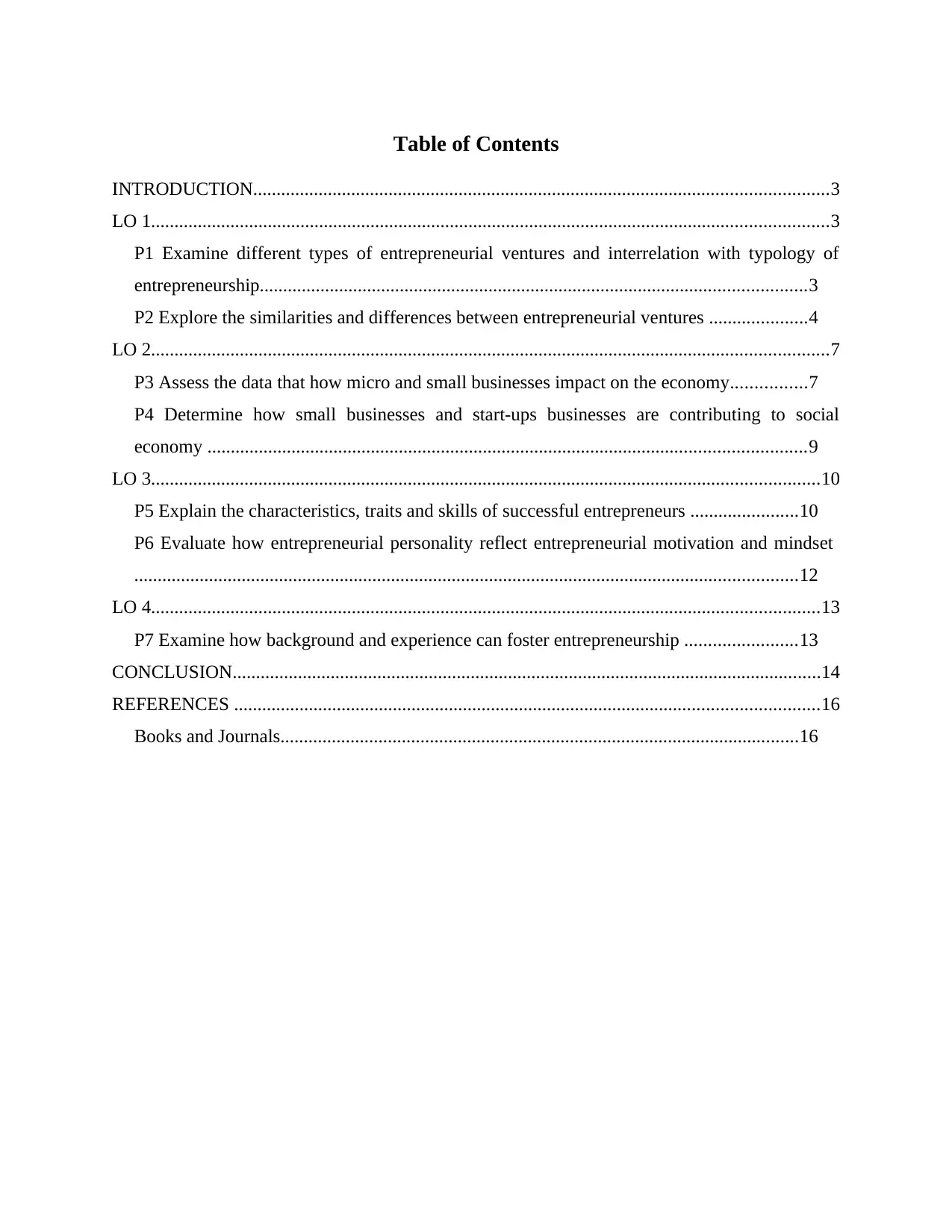
Table of Contents
INTRODUCTION...........................................................................................................................3
LO 1.................................................................................................................................................3
P1 Examine different types of entrepreneurial ventures and interrelation with typology of
entrepreneurship.....................................................................................................................3
P2 Explore the similarities and differences between entrepreneurial ventures .....................4
LO 2.................................................................................................................................................7
P3 Assess the data that how micro and small businesses impact on the economy................7
P4 Determine how small businesses and start-ups businesses are contributing to social
economy ................................................................................................................................9
LO 3...............................................................................................................................................10
P5 Explain the characteristics, traits and skills of successful entrepreneurs .......................10
P6 Evaluate how entrepreneurial personality reflect entrepreneurial motivation and mindset
..............................................................................................................................................12
LO 4...............................................................................................................................................13
P7 Examine how background and experience can foster entrepreneurship ........................13
CONCLUSION..............................................................................................................................14
REFERENCES .............................................................................................................................16
Books and Journals...............................................................................................................16
INTRODUCTION...........................................................................................................................3
LO 1.................................................................................................................................................3
P1 Examine different types of entrepreneurial ventures and interrelation with typology of
entrepreneurship.....................................................................................................................3
P2 Explore the similarities and differences between entrepreneurial ventures .....................4
LO 2.................................................................................................................................................7
P3 Assess the data that how micro and small businesses impact on the economy................7
P4 Determine how small businesses and start-ups businesses are contributing to social
economy ................................................................................................................................9
LO 3...............................................................................................................................................10
P5 Explain the characteristics, traits and skills of successful entrepreneurs .......................10
P6 Evaluate how entrepreneurial personality reflect entrepreneurial motivation and mindset
..............................................................................................................................................12
LO 4...............................................................................................................................................13
P7 Examine how background and experience can foster entrepreneurship ........................13
CONCLUSION..............................................................................................................................14
REFERENCES .............................................................................................................................16
Books and Journals...............................................................................................................16
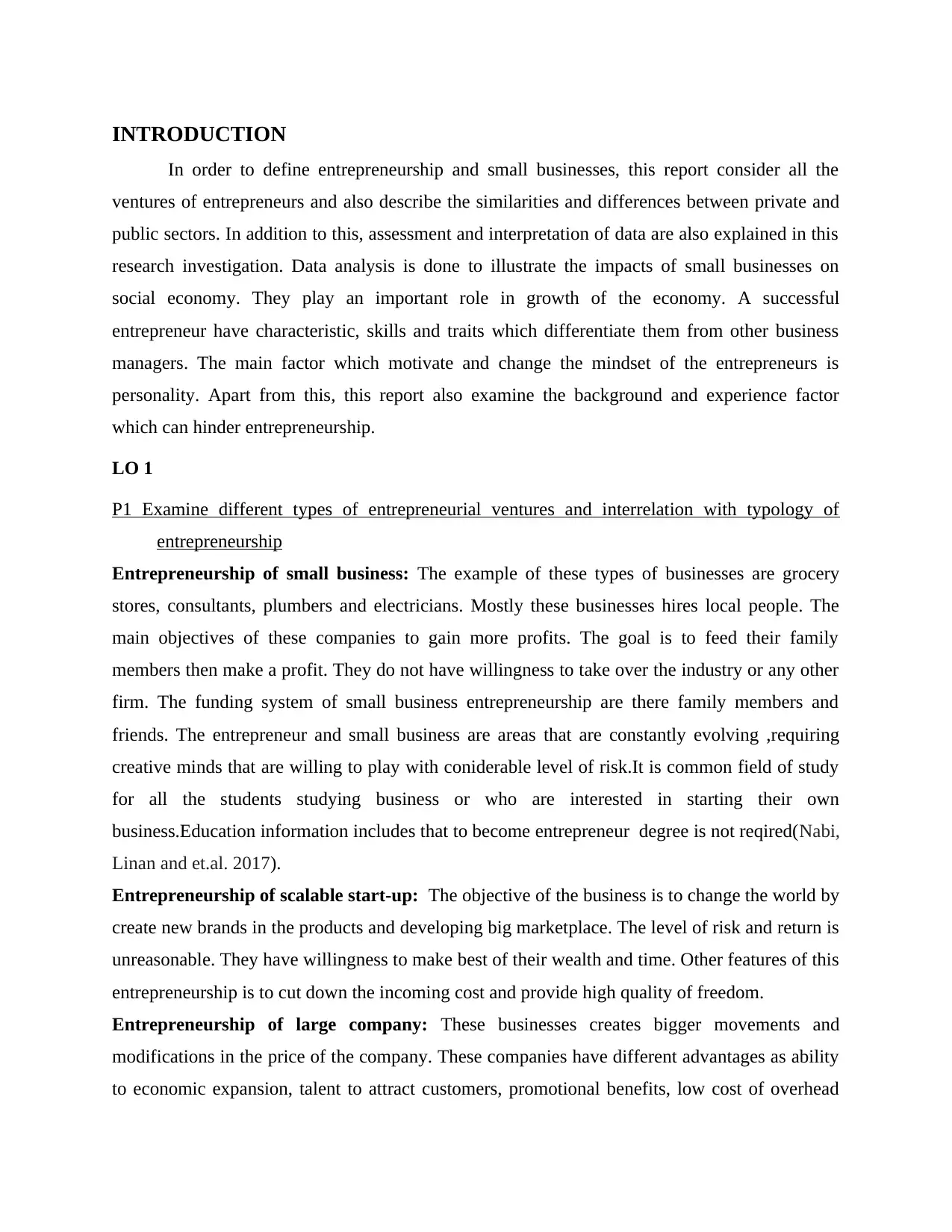
INTRODUCTION
In order to define entrepreneurship and small businesses, this report consider all the
ventures of entrepreneurs and also describe the similarities and differences between private and
public sectors. In addition to this, assessment and interpretation of data are also explained in this
research investigation. Data analysis is done to illustrate the impacts of small businesses on
social economy. They play an important role in growth of the economy. A successful
entrepreneur have characteristic, skills and traits which differentiate them from other business
managers. The main factor which motivate and change the mindset of the entrepreneurs is
personality. Apart from this, this report also examine the background and experience factor
which can hinder entrepreneurship.
LO 1
P1 Examine different types of entrepreneurial ventures and interrelation with typology of
entrepreneurship
Entrepreneurship of small business: The example of these types of businesses are grocery
stores, consultants, plumbers and electricians. Mostly these businesses hires local people. The
main objectives of these companies to gain more profits. The goal is to feed their family
members then make a profit. They do not have willingness to take over the industry or any other
firm. The funding system of small business entrepreneurship are there family members and
friends. The entrepreneur and small business are areas that are constantly evolving ,requiring
creative minds that are willing to play with coniderable level of risk.It is common field of study
for all the students studying business or who are interested in starting their own
business.Education information includes that to become entrepreneur degree is not reqired(Nabi,
Linan and et.al. 2017).
Entrepreneurship of scalable start-up: The objective of the business is to change the world by
create new brands in the products and developing big marketplace. The level of risk and return is
unreasonable. They have willingness to make best of their wealth and time. Other features of this
entrepreneurship is to cut down the incoming cost and provide high quality of freedom.
Entrepreneurship of large company: These businesses creates bigger movements and
modifications in the price of the company. These companies have different advantages as ability
to economic expansion, talent to attract customers, promotional benefits, low cost of overhead
In order to define entrepreneurship and small businesses, this report consider all the
ventures of entrepreneurs and also describe the similarities and differences between private and
public sectors. In addition to this, assessment and interpretation of data are also explained in this
research investigation. Data analysis is done to illustrate the impacts of small businesses on
social economy. They play an important role in growth of the economy. A successful
entrepreneur have characteristic, skills and traits which differentiate them from other business
managers. The main factor which motivate and change the mindset of the entrepreneurs is
personality. Apart from this, this report also examine the background and experience factor
which can hinder entrepreneurship.
LO 1
P1 Examine different types of entrepreneurial ventures and interrelation with typology of
entrepreneurship
Entrepreneurship of small business: The example of these types of businesses are grocery
stores, consultants, plumbers and electricians. Mostly these businesses hires local people. The
main objectives of these companies to gain more profits. The goal is to feed their family
members then make a profit. They do not have willingness to take over the industry or any other
firm. The funding system of small business entrepreneurship are there family members and
friends. The entrepreneur and small business are areas that are constantly evolving ,requiring
creative minds that are willing to play with coniderable level of risk.It is common field of study
for all the students studying business or who are interested in starting their own
business.Education information includes that to become entrepreneur degree is not reqired(Nabi,
Linan and et.al. 2017).
Entrepreneurship of scalable start-up: The objective of the business is to change the world by
create new brands in the products and developing big marketplace. The level of risk and return is
unreasonable. They have willingness to make best of their wealth and time. Other features of this
entrepreneurship is to cut down the incoming cost and provide high quality of freedom.
Entrepreneurship of large company: These businesses creates bigger movements and
modifications in the price of the company. These companies have different advantages as ability
to economic expansion, talent to attract customers, promotional benefits, low cost of overhead
⊘ This is a preview!⊘
Do you want full access?
Subscribe today to unlock all pages.

Trusted by 1+ million students worldwide
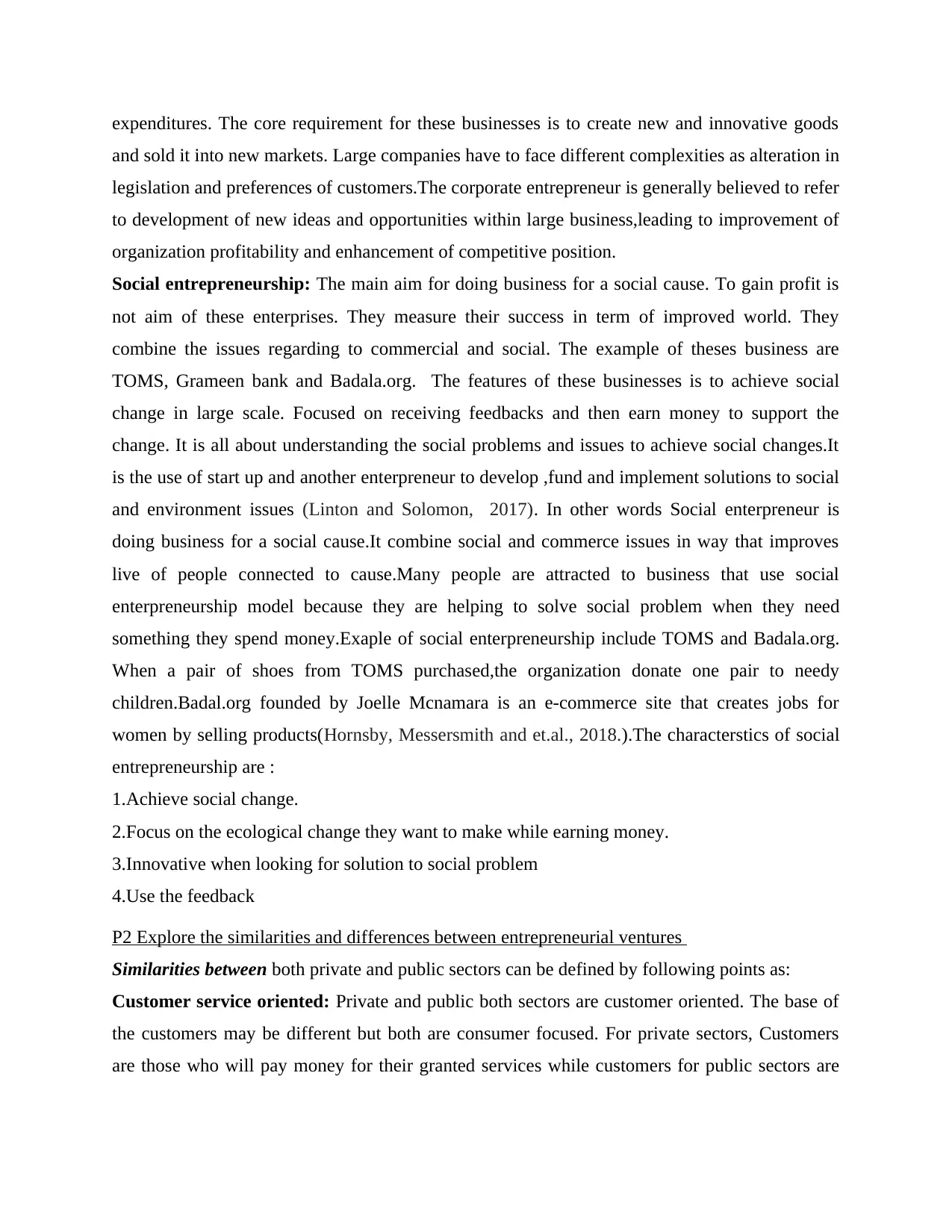
expenditures. The core requirement for these businesses is to create new and innovative goods
and sold it into new markets. Large companies have to face different complexities as alteration in
legislation and preferences of customers.The corporate entrepreneur is generally believed to refer
to development of new ideas and opportunities within large business,leading to improvement of
organization profitability and enhancement of competitive position.
Social entrepreneurship: The main aim for doing business for a social cause. To gain profit is
not aim of these enterprises. They measure their success in term of improved world. They
combine the issues regarding to commercial and social. The example of theses business are
TOMS, Grameen bank and Badala.org. The features of these businesses is to achieve social
change in large scale. Focused on receiving feedbacks and then earn money to support the
change. It is all about understanding the social problems and issues to achieve social changes.It
is the use of start up and another enterpreneur to develop ,fund and implement solutions to social
and environment issues (Linton and Solomon, 2017). In other words Social enterpreneur is
doing business for a social cause.It combine social and commerce issues in way that improves
live of people connected to cause.Many people are attracted to business that use social
enterpreneurship model because they are helping to solve social problem when they need
something they spend money.Exaple of social enterpreneurship include TOMS and Badala.org.
When a pair of shoes from TOMS purchased,the organization donate one pair to needy
children.Badal.org founded by Joelle Mcnamara is an e-commerce site that creates jobs for
women by selling products(Hornsby, Messersmith and et.al., 2018.).The characterstics of social
entrepreneurship are :
1.Achieve social change.
2.Focus on the ecological change they want to make while earning money.
3.Innovative when looking for solution to social problem
4.Use the feedback
P2 Explore the similarities and differences between entrepreneurial ventures
Similarities between both private and public sectors can be defined by following points as:
Customer service oriented: Private and public both sectors are customer oriented. The base of
the customers may be different but both are consumer focused. For private sectors, Customers
are those who will pay money for their granted services while customers for public sectors are
and sold it into new markets. Large companies have to face different complexities as alteration in
legislation and preferences of customers.The corporate entrepreneur is generally believed to refer
to development of new ideas and opportunities within large business,leading to improvement of
organization profitability and enhancement of competitive position.
Social entrepreneurship: The main aim for doing business for a social cause. To gain profit is
not aim of these enterprises. They measure their success in term of improved world. They
combine the issues regarding to commercial and social. The example of theses business are
TOMS, Grameen bank and Badala.org. The features of these businesses is to achieve social
change in large scale. Focused on receiving feedbacks and then earn money to support the
change. It is all about understanding the social problems and issues to achieve social changes.It
is the use of start up and another enterpreneur to develop ,fund and implement solutions to social
and environment issues (Linton and Solomon, 2017). In other words Social enterpreneur is
doing business for a social cause.It combine social and commerce issues in way that improves
live of people connected to cause.Many people are attracted to business that use social
enterpreneurship model because they are helping to solve social problem when they need
something they spend money.Exaple of social enterpreneurship include TOMS and Badala.org.
When a pair of shoes from TOMS purchased,the organization donate one pair to needy
children.Badal.org founded by Joelle Mcnamara is an e-commerce site that creates jobs for
women by selling products(Hornsby, Messersmith and et.al., 2018.).The characterstics of social
entrepreneurship are :
1.Achieve social change.
2.Focus on the ecological change they want to make while earning money.
3.Innovative when looking for solution to social problem
4.Use the feedback
P2 Explore the similarities and differences between entrepreneurial ventures
Similarities between both private and public sectors can be defined by following points as:
Customer service oriented: Private and public both sectors are customer oriented. The base of
the customers may be different but both are consumer focused. For private sectors, Customers
are those who will pay money for their granted services while customers for public sectors are
Paraphrase This Document
Need a fresh take? Get an instant paraphrase of this document with our AI Paraphraser
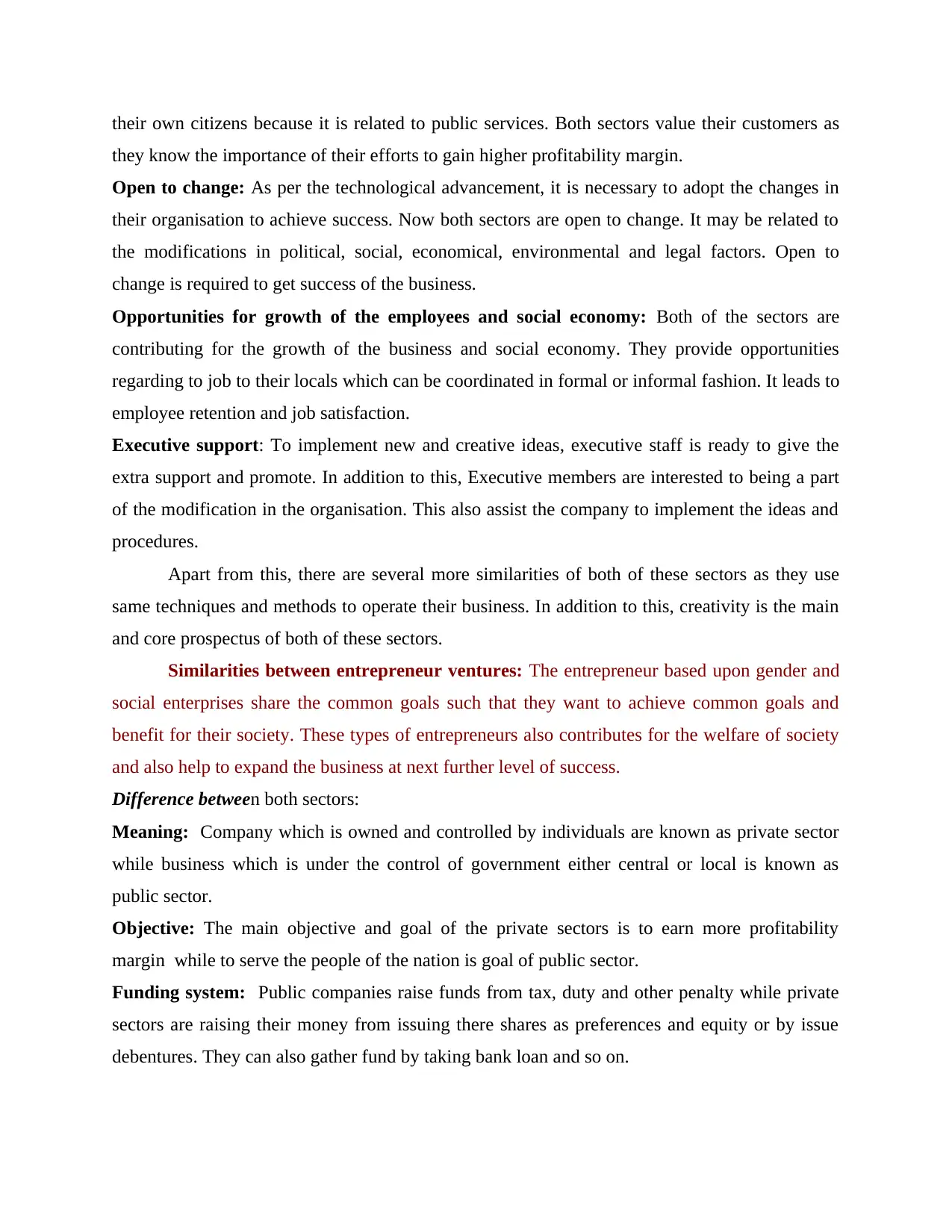
their own citizens because it is related to public services. Both sectors value their customers as
they know the importance of their efforts to gain higher profitability margin.
Open to change: As per the technological advancement, it is necessary to adopt the changes in
their organisation to achieve success. Now both sectors are open to change. It may be related to
the modifications in political, social, economical, environmental and legal factors. Open to
change is required to get success of the business.
Opportunities for growth of the employees and social economy: Both of the sectors are
contributing for the growth of the business and social economy. They provide opportunities
regarding to job to their locals which can be coordinated in formal or informal fashion. It leads to
employee retention and job satisfaction.
Executive support: To implement new and creative ideas, executive staff is ready to give the
extra support and promote. In addition to this, Executive members are interested to being a part
of the modification in the organisation. This also assist the company to implement the ideas and
procedures.
Apart from this, there are several more similarities of both of these sectors as they use
same techniques and methods to operate their business. In addition to this, creativity is the main
and core prospectus of both of these sectors.
Similarities between entrepreneur ventures: The entrepreneur based upon gender and
social enterprises share the common goals such that they want to achieve common goals and
benefit for their society. These types of entrepreneurs also contributes for the welfare of society
and also help to expand the business at next further level of success.
Difference between both sectors:
Meaning: Company which is owned and controlled by individuals are known as private sector
while business which is under the control of government either central or local is known as
public sector.
Objective: The main objective and goal of the private sectors is to earn more profitability
margin while to serve the people of the nation is goal of public sector.
Funding system: Public companies raise funds from tax, duty and other penalty while private
sectors are raising their money from issuing there shares as preferences and equity or by issue
debentures. They can also gather fund by taking bank loan and so on.
they know the importance of their efforts to gain higher profitability margin.
Open to change: As per the technological advancement, it is necessary to adopt the changes in
their organisation to achieve success. Now both sectors are open to change. It may be related to
the modifications in political, social, economical, environmental and legal factors. Open to
change is required to get success of the business.
Opportunities for growth of the employees and social economy: Both of the sectors are
contributing for the growth of the business and social economy. They provide opportunities
regarding to job to their locals which can be coordinated in formal or informal fashion. It leads to
employee retention and job satisfaction.
Executive support: To implement new and creative ideas, executive staff is ready to give the
extra support and promote. In addition to this, Executive members are interested to being a part
of the modification in the organisation. This also assist the company to implement the ideas and
procedures.
Apart from this, there are several more similarities of both of these sectors as they use
same techniques and methods to operate their business. In addition to this, creativity is the main
and core prospectus of both of these sectors.
Similarities between entrepreneur ventures: The entrepreneur based upon gender and
social enterprises share the common goals such that they want to achieve common goals and
benefit for their society. These types of entrepreneurs also contributes for the welfare of society
and also help to expand the business at next further level of success.
Difference between both sectors:
Meaning: Company which is owned and controlled by individuals are known as private sector
while business which is under the control of government either central or local is known as
public sector.
Objective: The main objective and goal of the private sectors is to earn more profitability
margin while to serve the people of the nation is goal of public sector.
Funding system: Public companies raise funds from tax, duty and other penalty while private
sectors are raising their money from issuing there shares as preferences and equity or by issue
debentures. They can also gather fund by taking bank loan and so on.
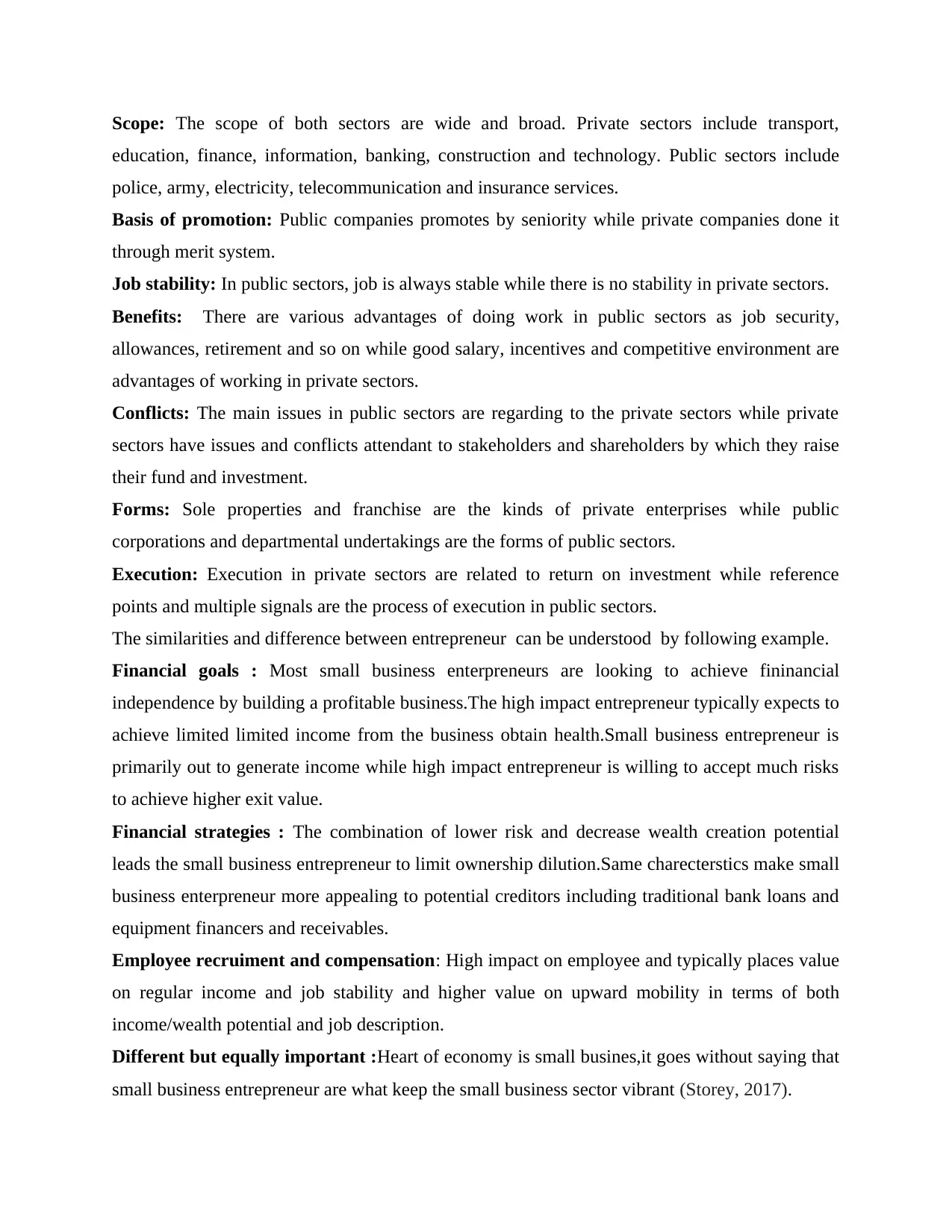
Scope: The scope of both sectors are wide and broad. Private sectors include transport,
education, finance, information, banking, construction and technology. Public sectors include
police, army, electricity, telecommunication and insurance services.
Basis of promotion: Public companies promotes by seniority while private companies done it
through merit system.
Job stability: In public sectors, job is always stable while there is no stability in private sectors.
Benefits: There are various advantages of doing work in public sectors as job security,
allowances, retirement and so on while good salary, incentives and competitive environment are
advantages of working in private sectors.
Conflicts: The main issues in public sectors are regarding to the private sectors while private
sectors have issues and conflicts attendant to stakeholders and shareholders by which they raise
their fund and investment.
Forms: Sole properties and franchise are the kinds of private enterprises while public
corporations and departmental undertakings are the forms of public sectors.
Execution: Execution in private sectors are related to return on investment while reference
points and multiple signals are the process of execution in public sectors.
The similarities and difference between entrepreneur can be understood by following example.
Financial goals : Most small business enterpreneurs are looking to achieve fininancial
independence by building a profitable business.The high impact entrepreneur typically expects to
achieve limited limited income from the business obtain health.Small business entrepreneur is
primarily out to generate income while high impact entrepreneur is willing to accept much risks
to achieve higher exit value.
Financial strategies : The combination of lower risk and decrease wealth creation potential
leads the small business entrepreneur to limit ownership dilution.Same charecterstics make small
business enterpreneur more appealing to potential creditors including traditional bank loans and
equipment financers and receivables.
Employee recruiment and compensation: High impact on employee and typically places value
on regular income and job stability and higher value on upward mobility in terms of both
income/wealth potential and job description.
Different but equally important :Heart of economy is small busines,it goes without saying that
small business entrepreneur are what keep the small business sector vibrant (Storey, 2017).
education, finance, information, banking, construction and technology. Public sectors include
police, army, electricity, telecommunication and insurance services.
Basis of promotion: Public companies promotes by seniority while private companies done it
through merit system.
Job stability: In public sectors, job is always stable while there is no stability in private sectors.
Benefits: There are various advantages of doing work in public sectors as job security,
allowances, retirement and so on while good salary, incentives and competitive environment are
advantages of working in private sectors.
Conflicts: The main issues in public sectors are regarding to the private sectors while private
sectors have issues and conflicts attendant to stakeholders and shareholders by which they raise
their fund and investment.
Forms: Sole properties and franchise are the kinds of private enterprises while public
corporations and departmental undertakings are the forms of public sectors.
Execution: Execution in private sectors are related to return on investment while reference
points and multiple signals are the process of execution in public sectors.
The similarities and difference between entrepreneur can be understood by following example.
Financial goals : Most small business enterpreneurs are looking to achieve fininancial
independence by building a profitable business.The high impact entrepreneur typically expects to
achieve limited limited income from the business obtain health.Small business entrepreneur is
primarily out to generate income while high impact entrepreneur is willing to accept much risks
to achieve higher exit value.
Financial strategies : The combination of lower risk and decrease wealth creation potential
leads the small business entrepreneur to limit ownership dilution.Same charecterstics make small
business enterpreneur more appealing to potential creditors including traditional bank loans and
equipment financers and receivables.
Employee recruiment and compensation: High impact on employee and typically places value
on regular income and job stability and higher value on upward mobility in terms of both
income/wealth potential and job description.
Different but equally important :Heart of economy is small busines,it goes without saying that
small business entrepreneur are what keep the small business sector vibrant (Storey, 2017).
⊘ This is a preview!⊘
Do you want full access?
Subscribe today to unlock all pages.

Trusted by 1+ million students worldwide
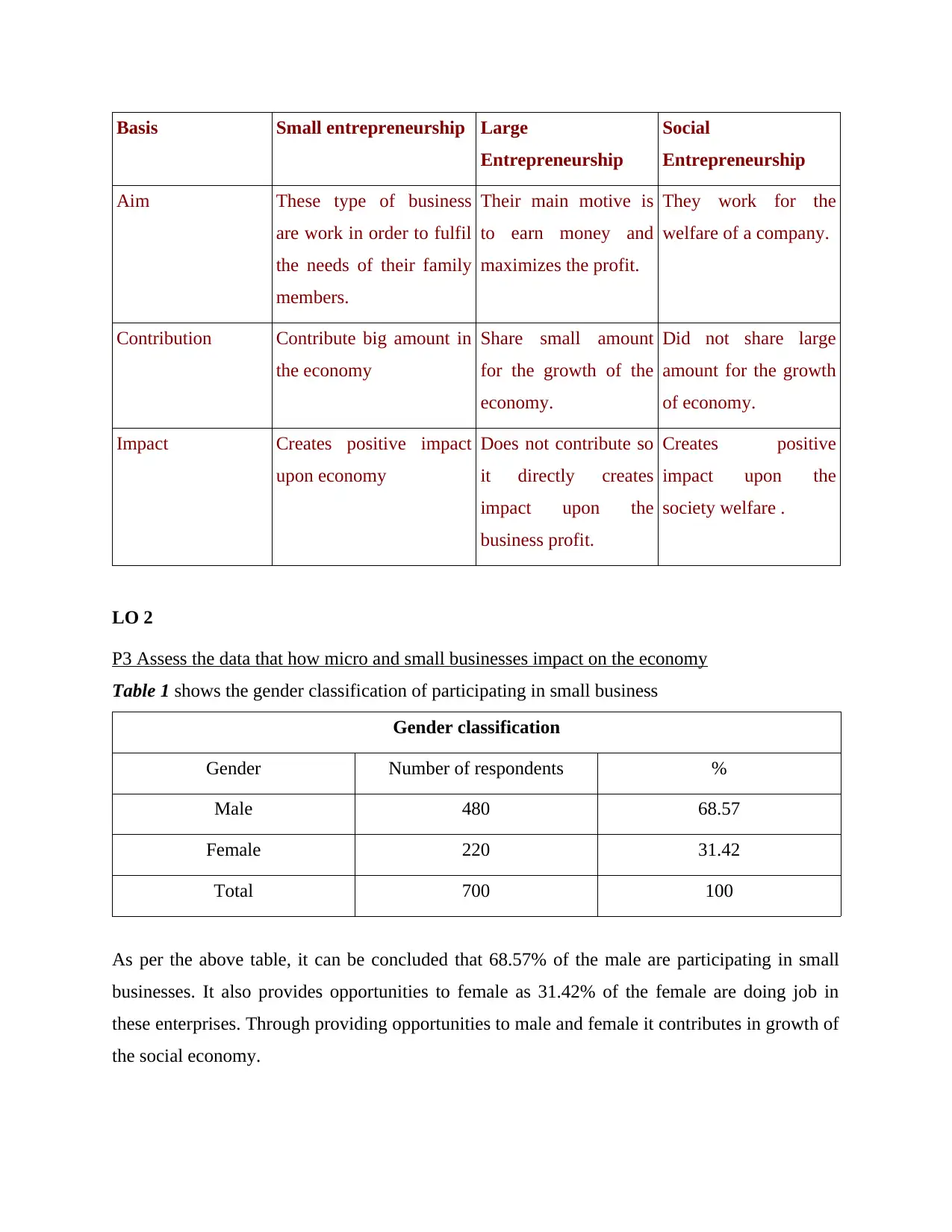
Basis Small entrepreneurship Large
Entrepreneurship
Social
Entrepreneurship
Aim These type of business
are work in order to fulfil
the needs of their family
members.
Their main motive is
to earn money and
maximizes the profit.
They work for the
welfare of a company.
Contribution Contribute big amount in
the economy
Share small amount
for the growth of the
economy.
Did not share large
amount for the growth
of economy.
Impact Creates positive impact
upon economy
Does not contribute so
it directly creates
impact upon the
business profit.
Creates positive
impact upon the
society welfare .
LO 2
P3 Assess the data that how micro and small businesses impact on the economy
Table 1 shows the gender classification of participating in small business
Gender classification
Gender Number of respondents %
Male 480 68.57
Female 220 31.42
Total 700 100
As per the above table, it can be concluded that 68.57% of the male are participating in small
businesses. It also provides opportunities to female as 31.42% of the female are doing job in
these enterprises. Through providing opportunities to male and female it contributes in growth of
the social economy.
Entrepreneurship
Social
Entrepreneurship
Aim These type of business
are work in order to fulfil
the needs of their family
members.
Their main motive is
to earn money and
maximizes the profit.
They work for the
welfare of a company.
Contribution Contribute big amount in
the economy
Share small amount
for the growth of the
economy.
Did not share large
amount for the growth
of economy.
Impact Creates positive impact
upon economy
Does not contribute so
it directly creates
impact upon the
business profit.
Creates positive
impact upon the
society welfare .
LO 2
P3 Assess the data that how micro and small businesses impact on the economy
Table 1 shows the gender classification of participating in small business
Gender classification
Gender Number of respondents %
Male 480 68.57
Female 220 31.42
Total 700 100
As per the above table, it can be concluded that 68.57% of the male are participating in small
businesses. It also provides opportunities to female as 31.42% of the female are doing job in
these enterprises. Through providing opportunities to male and female it contributes in growth of
the social economy.
Paraphrase This Document
Need a fresh take? Get an instant paraphrase of this document with our AI Paraphraser
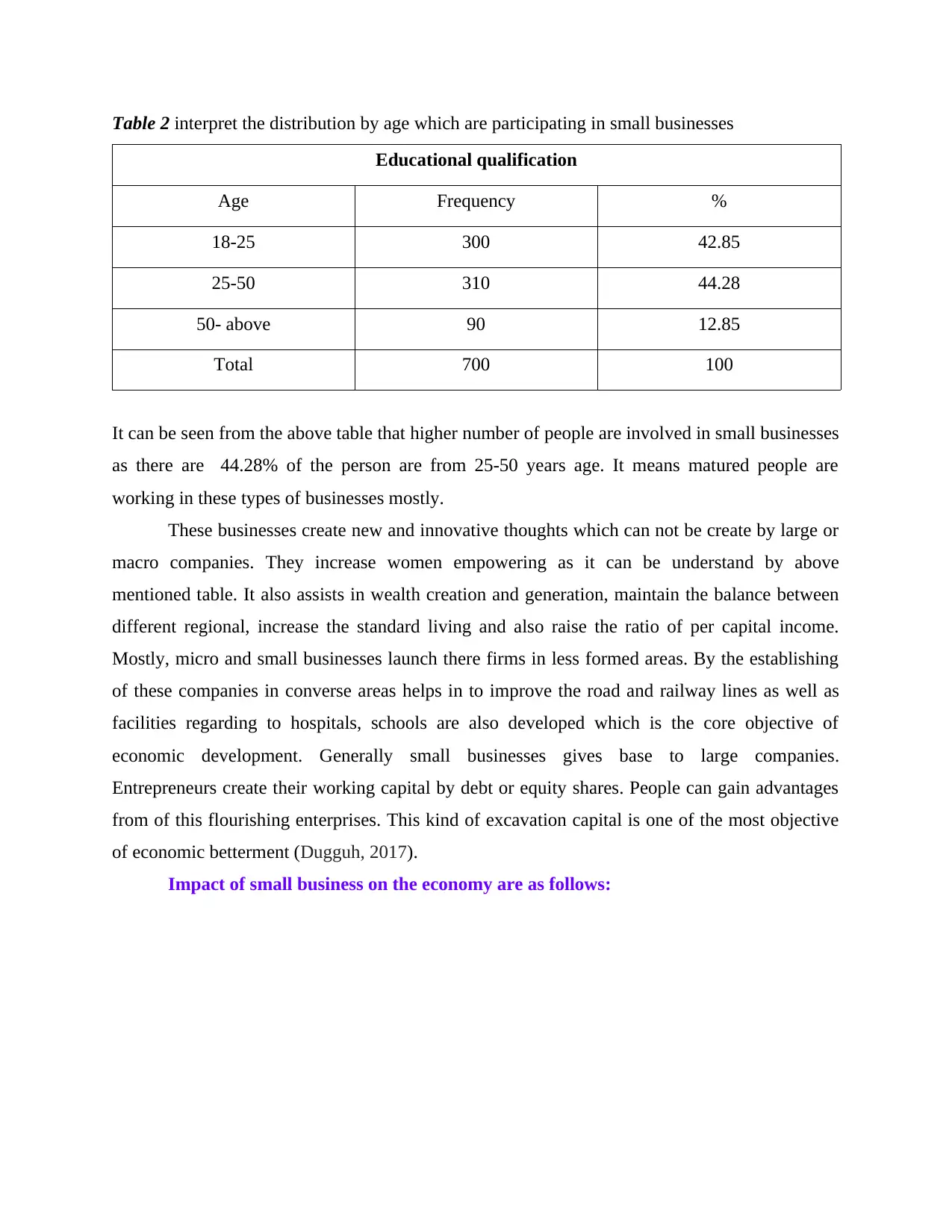
Table 2 interpret the distribution by age which are participating in small businesses
Educational qualification
Age Frequency %
18-25 300 42.85
25-50 310 44.28
50- above 90 12.85
Total 700 100
It can be seen from the above table that higher number of people are involved in small businesses
as there are 44.28% of the person are from 25-50 years age. It means matured people are
working in these types of businesses mostly.
These businesses create new and innovative thoughts which can not be create by large or
macro companies. They increase women empowering as it can be understand by above
mentioned table. It also assists in wealth creation and generation, maintain the balance between
different regional, increase the standard living and also raise the ratio of per capital income.
Mostly, micro and small businesses launch there firms in less formed areas. By the establishing
of these companies in converse areas helps in to improve the road and railway lines as well as
facilities regarding to hospitals, schools are also developed which is the core objective of
economic development. Generally small businesses gives base to large companies.
Entrepreneurs create their working capital by debt or equity shares. People can gain advantages
from of this flourishing enterprises. This kind of excavation capital is one of the most objective
of economic betterment (Dugguh, 2017).
Impact of small business on the economy are as follows:
Educational qualification
Age Frequency %
18-25 300 42.85
25-50 310 44.28
50- above 90 12.85
Total 700 100
It can be seen from the above table that higher number of people are involved in small businesses
as there are 44.28% of the person are from 25-50 years age. It means matured people are
working in these types of businesses mostly.
These businesses create new and innovative thoughts which can not be create by large or
macro companies. They increase women empowering as it can be understand by above
mentioned table. It also assists in wealth creation and generation, maintain the balance between
different regional, increase the standard living and also raise the ratio of per capital income.
Mostly, micro and small businesses launch there firms in less formed areas. By the establishing
of these companies in converse areas helps in to improve the road and railway lines as well as
facilities regarding to hospitals, schools are also developed which is the core objective of
economic development. Generally small businesses gives base to large companies.
Entrepreneurs create their working capital by debt or equity shares. People can gain advantages
from of this flourishing enterprises. This kind of excavation capital is one of the most objective
of economic betterment (Dugguh, 2017).
Impact of small business on the economy are as follows:
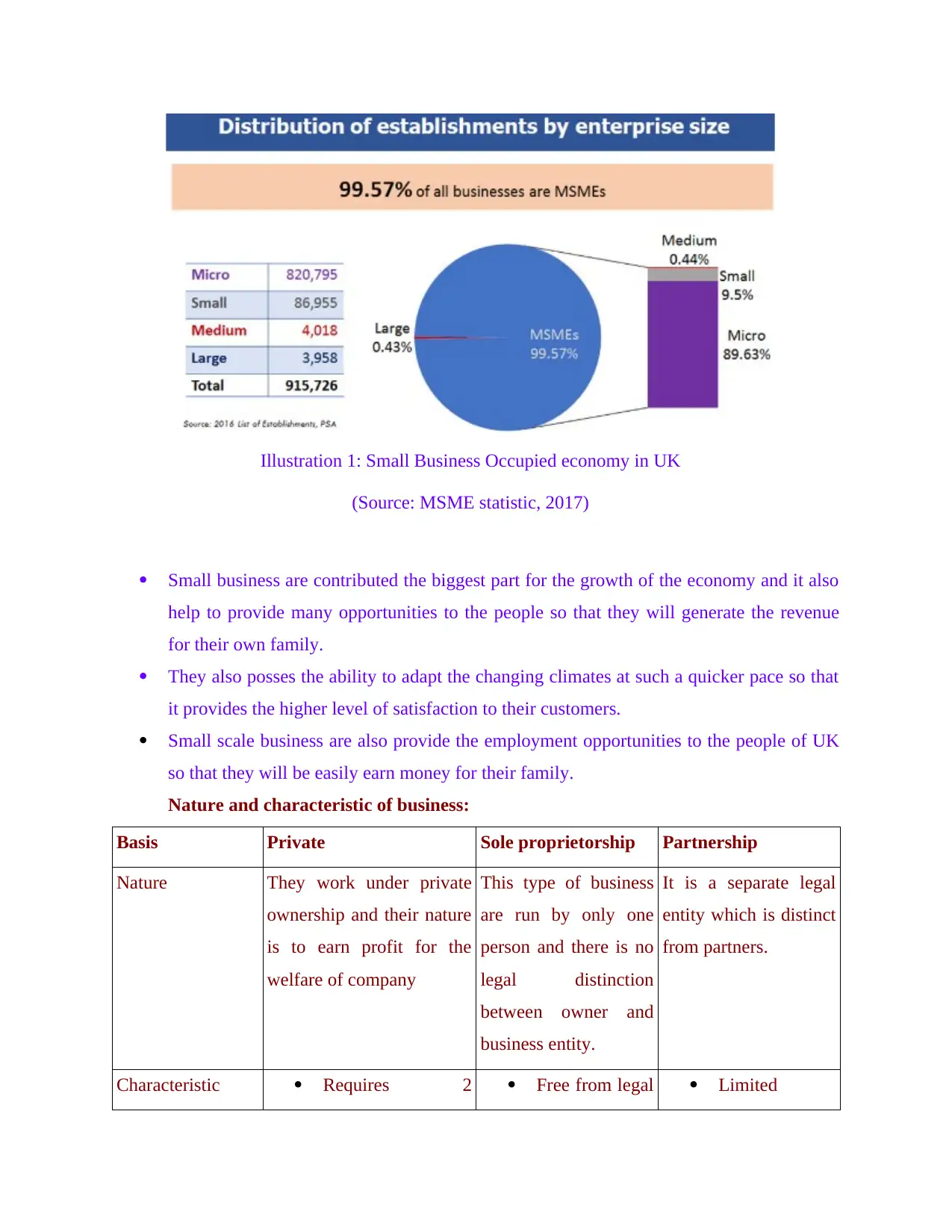
Small business are contributed the biggest part for the growth of the economy and it also
help to provide many opportunities to the people so that they will generate the revenue
for their own family.
They also posses the ability to adapt the changing climates at such a quicker pace so that
it provides the higher level of satisfaction to their customers.
Small scale business are also provide the employment opportunities to the people of UK
so that they will be easily earn money for their family.
Nature and characteristic of business:
Basis Private Sole proprietorship Partnership
Nature They work under private
ownership and their nature
is to earn profit for the
welfare of company
This type of business
are run by only one
person and there is no
legal distinction
between owner and
business entity.
It is a separate legal
entity which is distinct
from partners.
Characteristic Requires 2 Free from legal Limited
Illustration 1: Small Business Occupied economy in UK
(Source: MSME statistic, 2017)
help to provide many opportunities to the people so that they will generate the revenue
for their own family.
They also posses the ability to adapt the changing climates at such a quicker pace so that
it provides the higher level of satisfaction to their customers.
Small scale business are also provide the employment opportunities to the people of UK
so that they will be easily earn money for their family.
Nature and characteristic of business:
Basis Private Sole proprietorship Partnership
Nature They work under private
ownership and their nature
is to earn profit for the
welfare of company
This type of business
are run by only one
person and there is no
legal distinction
between owner and
business entity.
It is a separate legal
entity which is distinct
from partners.
Characteristic Requires 2 Free from legal Limited
Illustration 1: Small Business Occupied economy in UK
(Source: MSME statistic, 2017)
⊘ This is a preview!⊘
Do you want full access?
Subscribe today to unlock all pages.

Trusted by 1+ million students worldwide
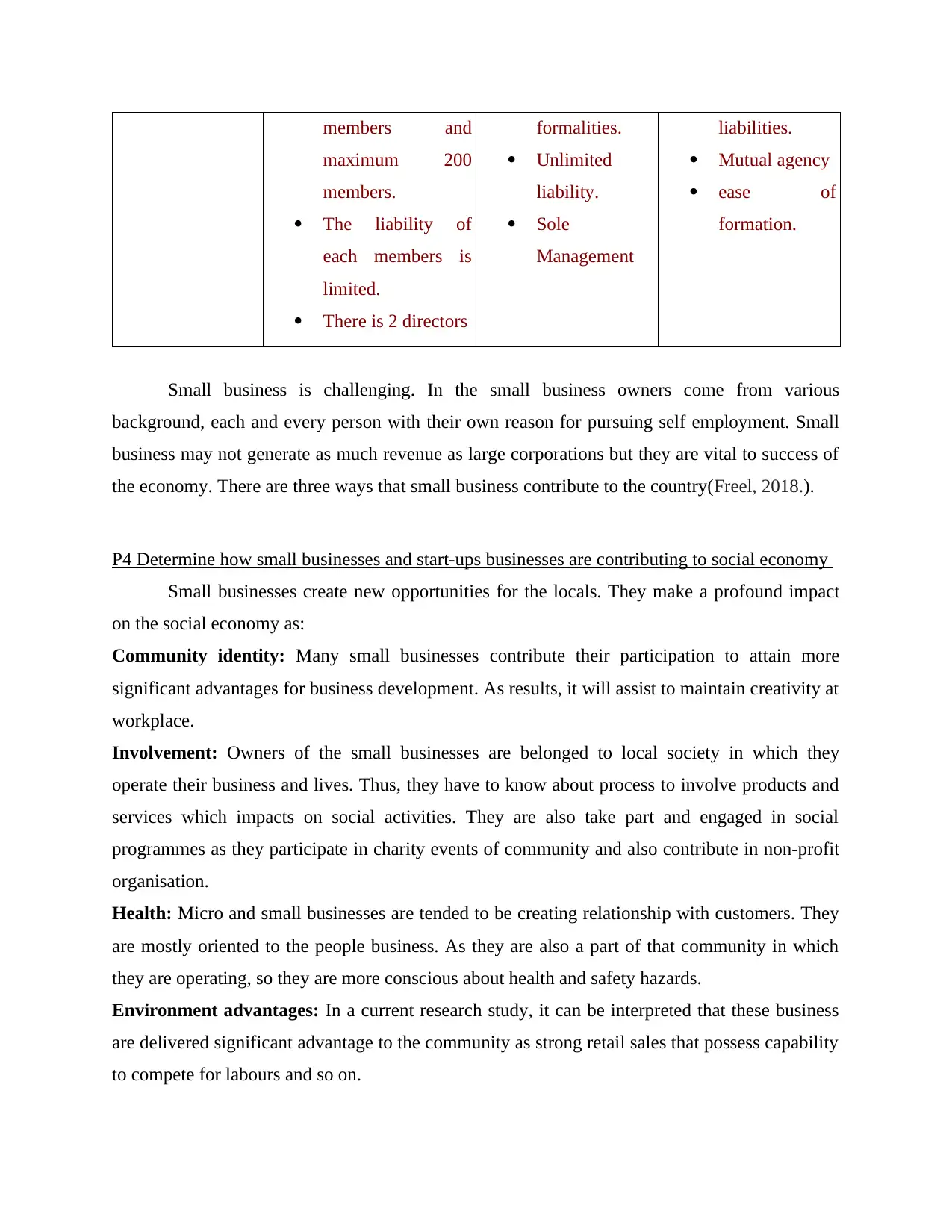
members and
maximum 200
members.
The liability of
each members is
limited.
There is 2 directors
formalities.
Unlimited
liability.
Sole
Management
liabilities.
Mutual agency
ease of
formation.
Small business is challenging. In the small business owners come from various
background, each and every person with their own reason for pursuing self employment. Small
business may not generate as much revenue as large corporations but they are vital to success of
the economy. There are three ways that small business contribute to the country(Freel, 2018.).
P4 Determine how small businesses and start-ups businesses are contributing to social economy
Small businesses create new opportunities for the locals. They make a profound impact
on the social economy as:
Community identity: Many small businesses contribute their participation to attain more
significant advantages for business development. As results, it will assist to maintain creativity at
workplace.
Involvement: Owners of the small businesses are belonged to local society in which they
operate their business and lives. Thus, they have to know about process to involve products and
services which impacts on social activities. They are also take part and engaged in social
programmes as they participate in charity events of community and also contribute in non-profit
organisation.
Health: Micro and small businesses are tended to be creating relationship with customers. They
are mostly oriented to the people business. As they are also a part of that community in which
they are operating, so they are more conscious about health and safety hazards.
Environment advantages: In a current research study, it can be interpreted that these business
are delivered significant advantage to the community as strong retail sales that possess capability
to compete for labours and so on.
maximum 200
members.
The liability of
each members is
limited.
There is 2 directors
formalities.
Unlimited
liability.
Sole
Management
liabilities.
Mutual agency
ease of
formation.
Small business is challenging. In the small business owners come from various
background, each and every person with their own reason for pursuing self employment. Small
business may not generate as much revenue as large corporations but they are vital to success of
the economy. There are three ways that small business contribute to the country(Freel, 2018.).
P4 Determine how small businesses and start-ups businesses are contributing to social economy
Small businesses create new opportunities for the locals. They make a profound impact
on the social economy as:
Community identity: Many small businesses contribute their participation to attain more
significant advantages for business development. As results, it will assist to maintain creativity at
workplace.
Involvement: Owners of the small businesses are belonged to local society in which they
operate their business and lives. Thus, they have to know about process to involve products and
services which impacts on social activities. They are also take part and engaged in social
programmes as they participate in charity events of community and also contribute in non-profit
organisation.
Health: Micro and small businesses are tended to be creating relationship with customers. They
are mostly oriented to the people business. As they are also a part of that community in which
they are operating, so they are more conscious about health and safety hazards.
Environment advantages: In a current research study, it can be interpreted that these business
are delivered significant advantage to the community as strong retail sales that possess capability
to compete for labours and so on.
Paraphrase This Document
Need a fresh take? Get an instant paraphrase of this document with our AI Paraphraser
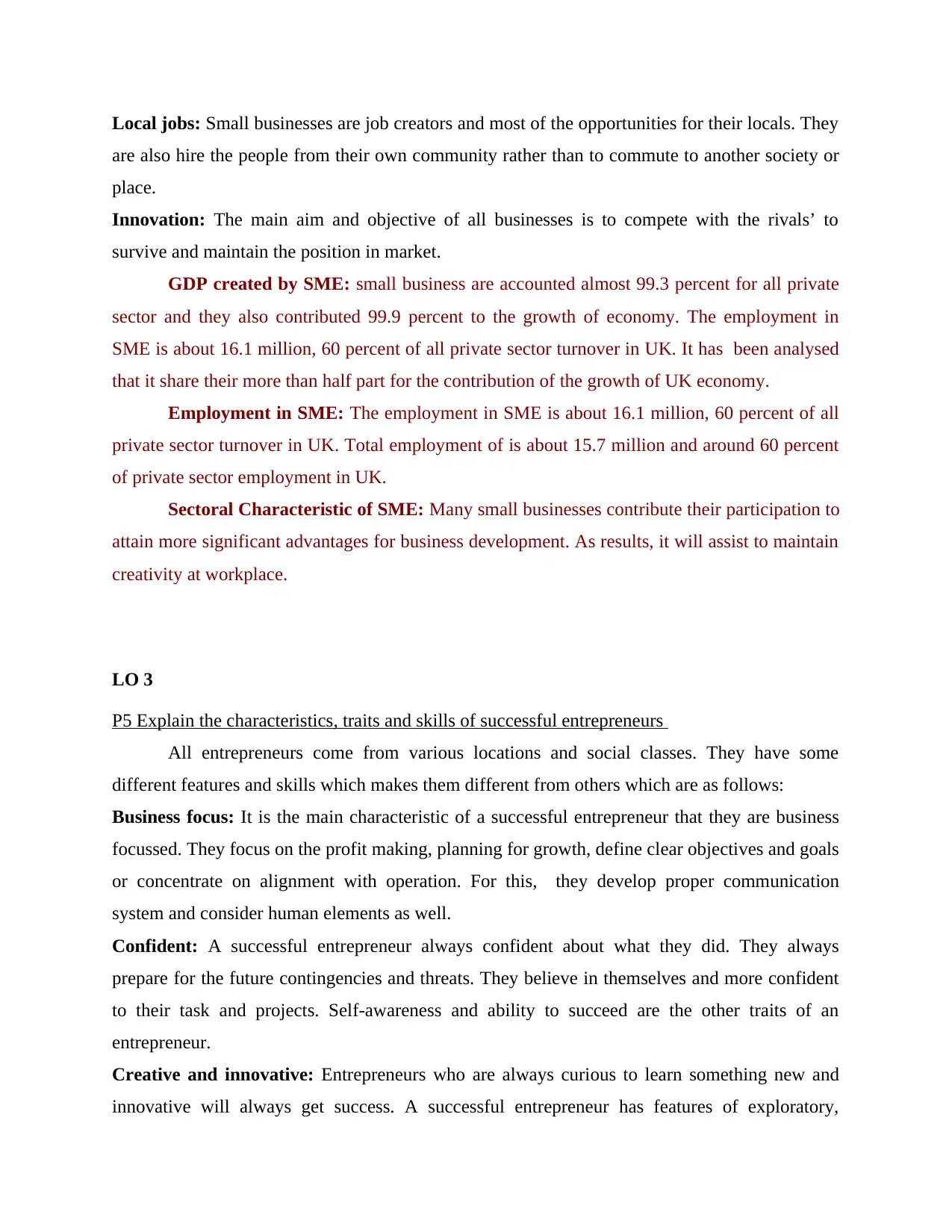
Local jobs: Small businesses are job creators and most of the opportunities for their locals. They
are also hire the people from their own community rather than to commute to another society or
place.
Innovation: The main aim and objective of all businesses is to compete with the rivals’ to
survive and maintain the position in market.
GDP created by SME: small business are accounted almost 99.3 percent for all private
sector and they also contributed 99.9 percent to the growth of economy. The employment in
SME is about 16.1 million, 60 percent of all private sector turnover in UK. It has been analysed
that it share their more than half part for the contribution of the growth of UK economy.
Employment in SME: The employment in SME is about 16.1 million, 60 percent of all
private sector turnover in UK. Total employment of is about 15.7 million and around 60 percent
of private sector employment in UK.
Sectoral Characteristic of SME: Many small businesses contribute their participation to
attain more significant advantages for business development. As results, it will assist to maintain
creativity at workplace.
LO 3
P5 Explain the characteristics, traits and skills of successful entrepreneurs
All entrepreneurs come from various locations and social classes. They have some
different features and skills which makes them different from others which are as follows:
Business focus: It is the main characteristic of a successful entrepreneur that they are business
focussed. They focus on the profit making, planning for growth, define clear objectives and goals
or concentrate on alignment with operation. For this, they develop proper communication
system and consider human elements as well.
Confident: A successful entrepreneur always confident about what they did. They always
prepare for the future contingencies and threats. They believe in themselves and more confident
to their task and projects. Self-awareness and ability to succeed are the other traits of an
entrepreneur.
Creative and innovative: Entrepreneurs who are always curious to learn something new and
innovative will always get success. A successful entrepreneur has features of exploratory,
are also hire the people from their own community rather than to commute to another society or
place.
Innovation: The main aim and objective of all businesses is to compete with the rivals’ to
survive and maintain the position in market.
GDP created by SME: small business are accounted almost 99.3 percent for all private
sector and they also contributed 99.9 percent to the growth of economy. The employment in
SME is about 16.1 million, 60 percent of all private sector turnover in UK. It has been analysed
that it share their more than half part for the contribution of the growth of UK economy.
Employment in SME: The employment in SME is about 16.1 million, 60 percent of all
private sector turnover in UK. Total employment of is about 15.7 million and around 60 percent
of private sector employment in UK.
Sectoral Characteristic of SME: Many small businesses contribute their participation to
attain more significant advantages for business development. As results, it will assist to maintain
creativity at workplace.
LO 3
P5 Explain the characteristics, traits and skills of successful entrepreneurs
All entrepreneurs come from various locations and social classes. They have some
different features and skills which makes them different from others which are as follows:
Business focus: It is the main characteristic of a successful entrepreneur that they are business
focussed. They focus on the profit making, planning for growth, define clear objectives and goals
or concentrate on alignment with operation. For this, they develop proper communication
system and consider human elements as well.
Confident: A successful entrepreneur always confident about what they did. They always
prepare for the future contingencies and threats. They believe in themselves and more confident
to their task and projects. Self-awareness and ability to succeed are the other traits of an
entrepreneur.
Creative and innovative: Entrepreneurs who are always curious to learn something new and
innovative will always get success. A successful entrepreneur has features of exploratory,
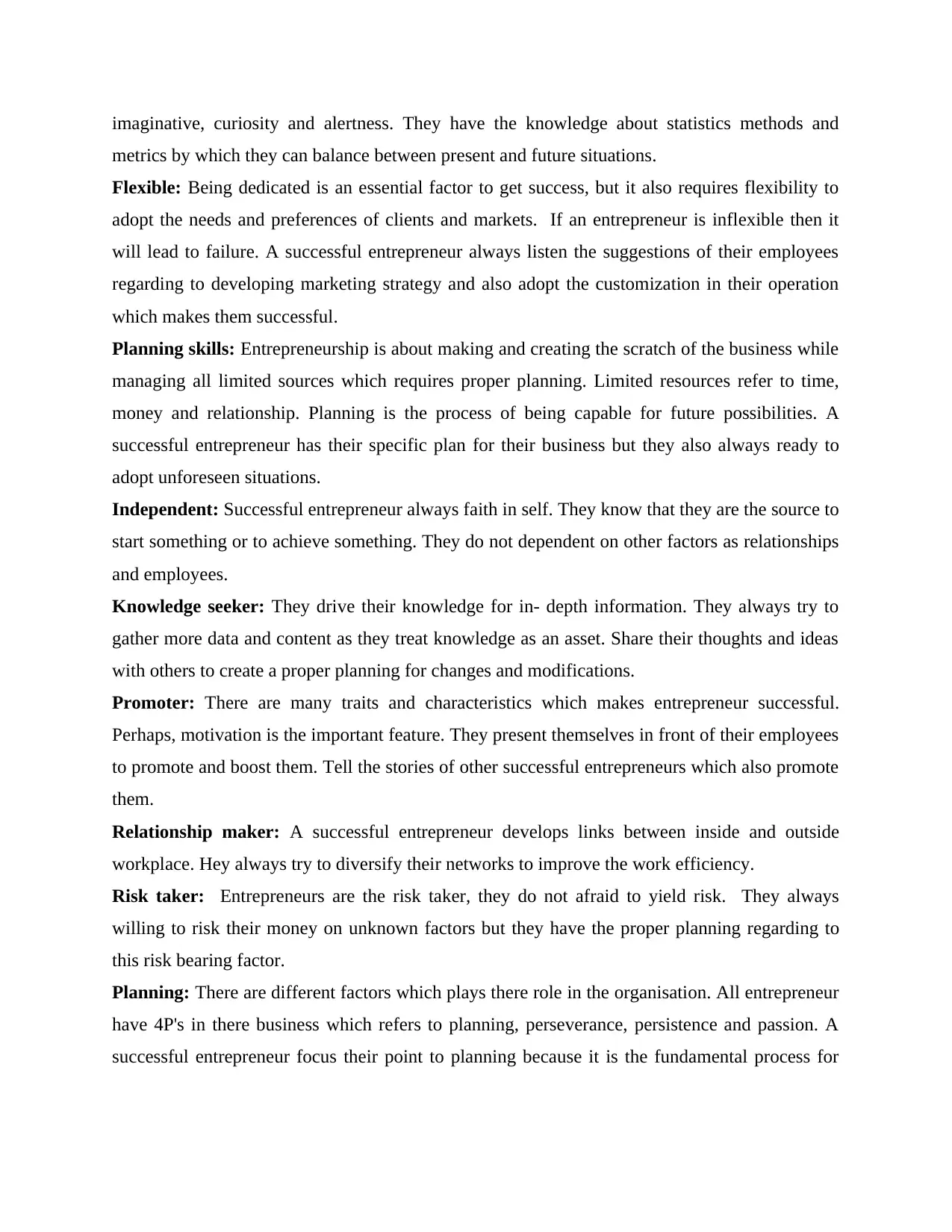
imaginative, curiosity and alertness. They have the knowledge about statistics methods and
metrics by which they can balance between present and future situations.
Flexible: Being dedicated is an essential factor to get success, but it also requires flexibility to
adopt the needs and preferences of clients and markets. If an entrepreneur is inflexible then it
will lead to failure. A successful entrepreneur always listen the suggestions of their employees
regarding to developing marketing strategy and also adopt the customization in their operation
which makes them successful.
Planning skills: Entrepreneurship is about making and creating the scratch of the business while
managing all limited sources which requires proper planning. Limited resources refer to time,
money and relationship. Planning is the process of being capable for future possibilities. A
successful entrepreneur has their specific plan for their business but they also always ready to
adopt unforeseen situations.
Independent: Successful entrepreneur always faith in self. They know that they are the source to
start something or to achieve something. They do not dependent on other factors as relationships
and employees.
Knowledge seeker: They drive their knowledge for in- depth information. They always try to
gather more data and content as they treat knowledge as an asset. Share their thoughts and ideas
with others to create a proper planning for changes and modifications.
Promoter: There are many traits and characteristics which makes entrepreneur successful.
Perhaps, motivation is the important feature. They present themselves in front of their employees
to promote and boost them. Tell the stories of other successful entrepreneurs which also promote
them.
Relationship maker: A successful entrepreneur develops links between inside and outside
workplace. Hey always try to diversify their networks to improve the work efficiency.
Risk taker: Entrepreneurs are the risk taker, they do not afraid to yield risk. They always
willing to risk their money on unknown factors but they have the proper planning regarding to
this risk bearing factor.
Planning: There are different factors which plays there role in the organisation. All entrepreneur
have 4P's in there business which refers to planning, perseverance, persistence and passion. A
successful entrepreneur focus their point to planning because it is the fundamental process for
metrics by which they can balance between present and future situations.
Flexible: Being dedicated is an essential factor to get success, but it also requires flexibility to
adopt the needs and preferences of clients and markets. If an entrepreneur is inflexible then it
will lead to failure. A successful entrepreneur always listen the suggestions of their employees
regarding to developing marketing strategy and also adopt the customization in their operation
which makes them successful.
Planning skills: Entrepreneurship is about making and creating the scratch of the business while
managing all limited sources which requires proper planning. Limited resources refer to time,
money and relationship. Planning is the process of being capable for future possibilities. A
successful entrepreneur has their specific plan for their business but they also always ready to
adopt unforeseen situations.
Independent: Successful entrepreneur always faith in self. They know that they are the source to
start something or to achieve something. They do not dependent on other factors as relationships
and employees.
Knowledge seeker: They drive their knowledge for in- depth information. They always try to
gather more data and content as they treat knowledge as an asset. Share their thoughts and ideas
with others to create a proper planning for changes and modifications.
Promoter: There are many traits and characteristics which makes entrepreneur successful.
Perhaps, motivation is the important feature. They present themselves in front of their employees
to promote and boost them. Tell the stories of other successful entrepreneurs which also promote
them.
Relationship maker: A successful entrepreneur develops links between inside and outside
workplace. Hey always try to diversify their networks to improve the work efficiency.
Risk taker: Entrepreneurs are the risk taker, they do not afraid to yield risk. They always
willing to risk their money on unknown factors but they have the proper planning regarding to
this risk bearing factor.
Planning: There are different factors which plays there role in the organisation. All entrepreneur
have 4P's in there business which refers to planning, perseverance, persistence and passion. A
successful entrepreneur focus their point to planning because it is the fundamental process for
⊘ This is a preview!⊘
Do you want full access?
Subscribe today to unlock all pages.

Trusted by 1+ million students worldwide
1 out of 17
Related Documents
Your All-in-One AI-Powered Toolkit for Academic Success.
+13062052269
info@desklib.com
Available 24*7 on WhatsApp / Email
![[object Object]](/_next/static/media/star-bottom.7253800d.svg)
Unlock your academic potential
Copyright © 2020–2026 A2Z Services. All Rights Reserved. Developed and managed by ZUCOL.




